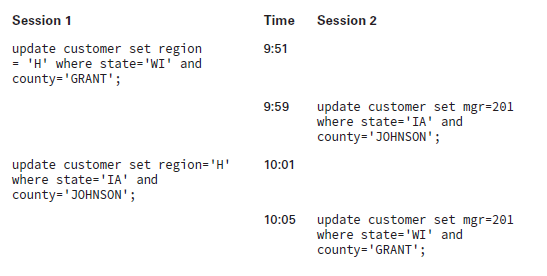- Home
- Database
- Oracle 12 C
- OCA Oracle 12C Administration(1Z0-062)
36.
To resolve a lock conflict, which of the following methods can you use? Choose all
that apply.
- A.Oracle automatically resolves the lock after a short but predefined time period by killing the session that is holding the lock.
- B.The DBA can kill the session holding the lock
- C.The user can either roll back or commit the transaction that is holding the lock.
- D.Oracle automatically resolves the lock after a short but predefined period by killing the session that is requesting the lock.
- Answer & Explanation
- Report
Answer : [B, C]
Explanation :
Explanation :
| Locks are resolved at the user level by either committing or rolling back the transaction holding the lock. Also, the DBA can kill the session holding the lock as a last resort. |
37.
Two transactions occur at the wall clock times in the following table. What happens
at 10:05?

- A.Session 2 will wait for session 1 to commit or roll back.
- B.Session 1 will wait for session 2 to commit or roll back.
- C.A deadlock will occur, and both sessions will hang unless one of the users cancels their statement or the DBA kills one of the sessions.
- D.A deadlock will occur, and Oracle will cancel one of the statements.
- E.Neither session is updating the same column, so no waiting or deadlock will occur.
- Answer & Explanation
- Report
Answer : [D]
Explanation :
Explanation :
| At 10:01, session 1 waits for session 2. At 10:05, a deadlock will occur; Oracle detects the deadlock and cancels one of the statements. |
38.
If all extents in an undo segment fill up, which of the following occurs next? Choose
all that apply.
- A.A new extent is allocated in the undo segment if all existing extents still contain active transaction data.
- B.Other transactions using the segment are moved to another existing segment with enough free space.
- C.A new undo segment is created, and the transaction that filled up the undo segment is moved in its entirety to another undo segment.
- D.The first extent in the segment is reused if the undo data in the first extent is not needed.
- E.The transaction that filled up the undo segment spills over to another undo segment.
- Answer & Explanation
- Report
Answer : [A, D]
Explanation :
Explanation :
| If a transaction fills up an undo segment, either a new extent is allocated for the undo segment or other extents in the segment are reused if the undo data in those extents is no longer needed by other transactions using the same undo segment. Transactions cannot cross segment boundaries in an undo tablespace, and they cannot move to another segment. |
39.
Which of the following commands returns control to the user immediately if a table is
already locked by another user?
- A.LOCK TABLE HR.EMPLOYEES IN EXCLUSIVE MODE WAIT DEFERRED;
- B.LOCK TABLE HR.EMPLOYEES IN SHARE MODE NOWAIT;
- C.LOCK TABLE HR.EMPLOYEES IN SHARE MODE WAIT DISABLED;
- D.LOCK TABLE HR.EMPLOYEES IN EXCLUSIVE MODE NOWAIT DEFERRED;
- Answer & Explanation
- Report
Answer : [B]
Explanation :
Explanation :
| Regardless of the type of lock requested, NOWAIT is required if you want the command with the lock request to terminate immediately if a lock is already held on the table. |
40.
Undo information falls into all the following categories except for which one?
- A.Uncommitted undo information
- B.Undo information required in case an instance crash requires a roll forward operation when the instance is restarted
- C.Committed undo information required to satisfy the undo retention interval
- D.Expired undo information that is no longer needed to support a running transaction
- Answer & Explanation
- Report
Answer : [B]
Explanation :
Explanation :
| Undo information is required for instance recovery but only to roll back uncommitted transactions after the online redo logs roll forward. The redo is used for roll forward, and undo is used to roll back uncommitted transactions. |